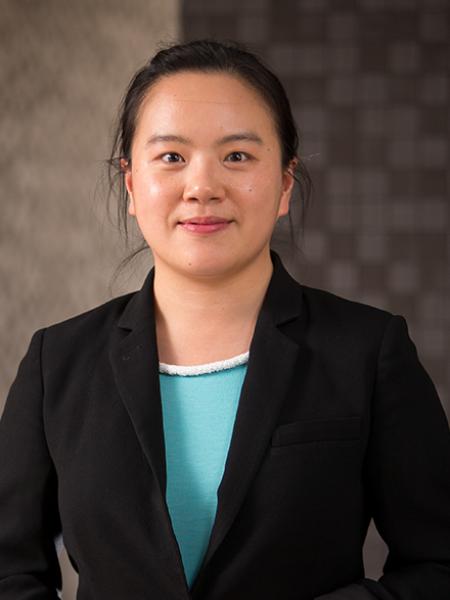Dr Ding Ding
Since her first teaching appointment in 2015, Dr Ding Ding has been on a mission to transform her students into tomorrow's leaders of business, economics and society. As a teacher of compulsory undergraduate and graduate finance courses, she specialises in large-class teaching of student cohorts up to 400.
Ding Ding's teaching skills were tested in early 2017 when, through necessity, she became the first lecturer at ANU to teach a regular class in the university's concert hall. In the face of what was a significant challenge, she relished the opportunity to expand her teaching repertoire and leverage on her creativity and adaptability. In doing so, she displayed leadership and courage beyond her experience level, and became a beacon for other teachers to follow into uncharted waters. Prior to this, her strategic introduction and use of PollEverywhere had had a synergistic effect on her colleagues, with many of them implementing the technology into their own teaching. As a result, it was adopted for campus-wide deployment.
In recognition of her dedication and talent, Ding Ding was awarded the ANU Vice-Chancellor's Citation for Outstanding Contribution to Student Learning (Early Career) in 2018, after winning the ANU College of Business and Economics (CBE) version of the award in 2017.
In 2018 Ding Ding was a recipient of an Australian Award for University Teaching - Citation for Outstanding Contribution to Student Learning.
Q&A
Q: What motivates and inspires you in your teaching?
While my goal is to help our students transform into tomorrow's leaders and realise their full potential, their trials and successes also inspire my continued growth as an educator. One story that particularly moved me involved a student whose life course changed after taking a class with me. I taught this student in 2017, and after the marks came out, she came to my office and presented me with a handwritten, nine-page letter. For the first two years of this students' studies, a lack of interest in Finance had resulted in her either failing, or merely passing classes - she had been pushed into the Bachelor of Finance degree by her parents. After coming to my classes, and engaging in random chats with me, she recalled that 'an intense interest was sparked,' and she ended up obtaining a High Distinction in the class. She told me that she I had single-handedly changed the course of her future career path, and she went on to do well in her remaining courses, often coming back to consult with me. She is now starting a Masters' degree with us in CBE, and I continue to mentor her progress. At the end of the day, stories like this really remind me that students are my inspiration. I may not be able to change the world, but I am grateful that I can help to shape the successes of my students.
Q: What do you enjoy most about being a teacher?
I love Finance, and teaching is a great platform for me to share this enthusiasm with a wider audience. I am very fortunate to be able to do what I love, every day! It's wonderful to see curiosity and joy brimming in the eyes of my students when I am teaching, and to talk to them in class and in consultations when they are eager to know more. An academic generally enjoys sharing intellectually, and initiating interest in my students is gratifying.
Q: How do you motivate, inspire and engage your students in and out of the classroom?
What has worked for me is taking the perspective of the students, getting to know them, and helping them to achieve their potential - whether they are consciously aware of their potential or not, I need to wake them up! In doing this, I use a variety of techniques and approaches to connect to them while delivering course content. Most students confess that my course content is packed and challenging, yet they are happy to study and ask for more extensions outside of classes because they find the material to be interesting and practical.
Q: What qualities do you need to be an outstanding teacher in higher education?
I am still working on improving! Compassion and humility work well, and it really helps when you have excellent role models to look up to.
Q: What are the ongoing challenges in developing your teaching practices?
Every cohort is different in its own learning style and class dynamic. I often need to adapt myself to a new cohort of students and adjust the content and approach accordingly. There is a fair bit of operational risk as well, as I have always been given a completely new classroom every time I have taught. This has meant that I am always needing to think of new strategies to engage my students and keep them interested. It can be tough to balance long hours, voluminous content, and an engaged student cohort. Frequently responding to circumstances that are outside my control has challenged my creativity, which has been both stressful and gratifying at the same time.
Q: Tell us about an approach you have taken in the classroom of which you've been proud.
Using PollEverywhere to engage with students, and helping to make it a staple resource for my colleagues!
If the VC asked you how you would change teaching and learning at the ANU, what would you tell him?
Less rules to allow our creativity to prosper. The new Kambri precinct is very exciting, and even though I have my own office within CBE, while touring the new teaching facilities I have an urge to take my laptop and work in the scattered sitting areas. The learning environment at ANU is becoming better and better!
